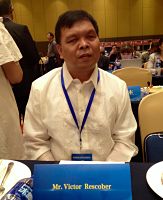More support for community-based OPDs
 The Global Disability Summit (GDS) can be a very significant event for people with disabilities if their voices are heard and if the international community addresses their needs properly and respects their human rights. We must therefore encourage greater participation by grassroots-level OPDs. It is essential to provide these organizations with the support they need to attend or be represented at international events like the GDS.
The Global Disability Summit (GDS) can be a very significant event for people with disabilities if their voices are heard and if the international community addresses their needs properly and respects their human rights. We must therefore encourage greater participation by grassroots-level OPDs. It is essential to provide these organizations with the support they need to attend or be represented at international events like the GDS.
All supporting organizations advocating for the rights, development and empowerment of persons with disabilities should consult persons with disabilities directly and encourage their active participation. They should be included in every stage, from planning through to policy development and programming. Supporting organizations should also help grassroots and community-based OPDs to access funding for their development projects.
Humanity & Inclusion (HI) is in the forefront when it comes to implementing clear, concrete policies and good practices for the empowerment of persons with disabilities. Working with HI is really fulfilling and meaningful as this is an organization that seeks to ensure that the full potential of persons with disabilities is being recognized and enhanced.
Promoting the rights of people with visual disabilities
The Philippine Blind Union (PBU) is the national federation of and for people with visual disabilities in the Philippines. There are approximately 500,000 blind or visually limited people in the country and the majority of them are poor and uneducated. We advocate for the promotion, protection and exercise of their basic human rights, we raise public awareness and fight for policy development.
The PBU works on inclusive education and training, employment and livelihood programs for blind and visually limited people, as well as on accessibility. We ensure equal access to programs and services by providing assistive devices, such as white canes. We also provide mobile phones for senior high school students with visual disabilities to allow them to access online classes.
A long road ahead to inclusion
Inclusion is not limited to social, economic, cultural or political aspects. Inclusion means that persons with disabilities are able to actively and meaningfully participate in all aspects of daily life, just like anybody else.
In the education field, we have seen an increase in the enrolment of special-needs education students in public elementary schools. According to the Department of Education, the numbers rose from 37,000 special-needs education students in 2014-2015 to 42,000 2015-2016. Over the same period, there were an estimated 40,000 blind and visually limited children of school age, according to the Resources for the Blind Inc. However, inclusive education is still at the very early stages in the Philippines, although a national policy is currently under discussion.
Much advocacy is still needed to achieve concrete outcomes in health and humanitarian action. Even when national guidelines exist, implementing good practices remains a challenge. This has been especially true during the COVID-19 pandemic. So persons with disabilities must really get out there and voice their needs if they are not to be left behind.





